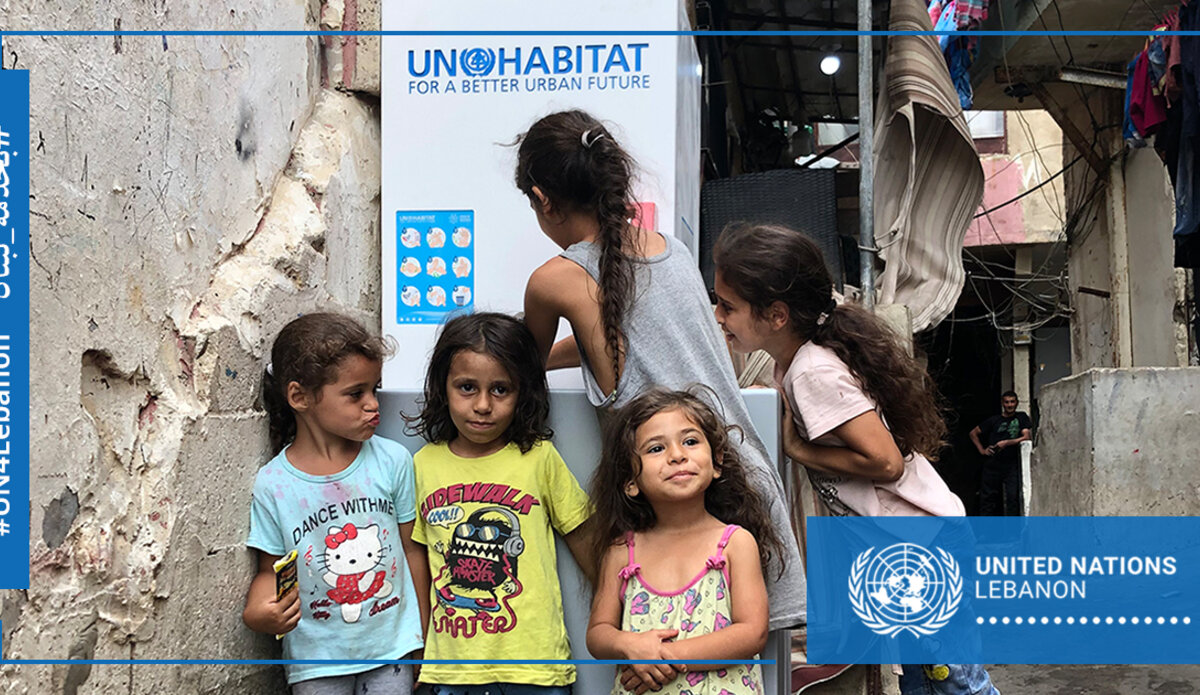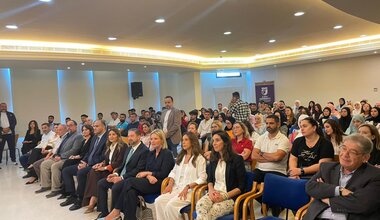UN Lebanon Releases 2020 Annual Report, Committing to Support Lebanon & its People to Build Back Better
UN Lebanon releases its 2020 annual report, committing to support Lebanon & its people to Build Back Better
Beirut, Lebanon
Wednesday, May 12, 2021 (United Nations) – The United Nations system in Lebanon released today its annual report for the year 2020, committing once again to scale up its efforts to help Lebanon and its people to recover from its multi-faceted crises and ‘Build Back Better’.
Through inspiring people’s stories and the ongoing commitment of the UN Country Team and its long-standing partners, the ‘2020 UN Lebanon Annual Results Report’ summarizes the results achieved throughout 2020, after four consecutive years of the implementation of the United Nations Strategic Framework for Lebanon 2017–2020 (UNSF). The UNSF outlines the UN’s common vision and expected contribution to support Lebanon’s political, human rights, humanitarian and development priorities as well as the country’s security.
“2020 was an exceptionally challenging year for Lebanon, marked by a series of socio-economic and political hardships that wreaked havoc on the people of Lebanon and continue to submerge the country with unprecedented challenges. Despite the scale of these challenges, UN Lebanon continues to support the people and commits to defend their rights to dignity, peace and justice,” said Najat Rochdi, UN Deputy Special Coordinator, Resident and Humanitarian Coordinator for Lebanon.
The report highlights key results achieved in response to the COVID19 pandemic and the Beirut port explosions as well as to the Syria crisis and other peace and development priorities set for 2020. These include, but are not limited to, the rehabilitation of 48 schools and around 6,000 residential and non-residential units severely damaged by the devastating explosions, as well as the provision of multipurpose cash assistance to around 91,500 persons.
According to the report, more than 1,200,000 vulnerable people across Lebanon were provided with better access to safe water and around 500,000 children, both Lebanese and refugees, were enrolled in formal education. Through the National Poverty Targeting Program (NPTP), more than 15,000 vulnerable Lebanese households benefited from food assistance in 2020, and over 120,000 Lebanese and non-Lebanese children and other vulnerable groups received cash grants, while thousands of Lebanese and Syrian workers benefited from short-term decent job opportunities.
“This is the raison d’être of the United Nations in Lebanon,” added Rochdi. “Whatever we do, be it in responding to emergencies, promoting peace and preventing conflict, supporting good governance, protecting human rights, promoting gender equality and reducing poverty, our overriding aim remains the same: to serve Lebanon and its people.”
In response to the COVID19 outbreak in Lebanon, the UN and its partners managed to expand hospitals’ bed capacity by procuring 73 fully equipped intensive care unit (ICU) beds and 800 equipped regular beds, together with 170 ventilators. To attenuate the effects of the pandemic on the most vulnerable, the UN also provided 50,000 of the poorest Lebanese households with food parcels, while 700 vulnerable migrant workers who lost their jobs due to COVID-19 and the socio-economic crisis were provided with cash assistance.
Ecologically, nearly 7,000 tons of CO2/equivalent were reduced during 2020 from solar hot water system and solar street lighting systems established by the UN in different parts of Lebanon, says the report, whereas approximately 17 municipalities, with a combined 310,000 people, benefited from improved solid waste management.
More results can be found in the report, accessible on the following URL: https://bit.ly/3o5d3B3
*******
الأمم المتحدة في لبنان تصدر تقريرها السنوي لعام 2020، ملتزمة بدعم لبنان وشعبه لإعادة البناء بشكل أفضل
بيروت، لبنان
الأربعاء 12 أيار/مايو 2021 (الأمم المتحدة) – أصدرت منظومة الأمم المتحدة في لبنان اليوم تقريرها السنوي لعام 2020، ملتزمةً مرة أخرى بتكثيف جهودها لمساعدة لبنان وشعبه على التعافي من أزماته المتعددة الأوجه و"إعادة البناء بشكل أفضل".
من خلال قصص مُلهمة للناس والالتزام المتواصل لفريق الأمم المتحدة الوطني وشركائه، يلخّص "التقرير السنوي للأمم المتحدة في لبنان لعام 2020" النتائج التي تحققت خلال عام 2020، أي بعد أربع سنوات متتالية من تنفيذ إطار عمل الأمم المتحدة الاستراتيجي للبنان للفترة 2017-2020. ويحدد هذا الإطار رؤية الأمم المتحدة المشتركة ومساهمتها المتوقّعة لجهة دعم أولويات لبنان السياسية، والحقوقية، والإنسانية، والتنموية بالإضافة إلى تلك المتعلقة بصَون السلم والأمن في البلاد.
قالت نجاة رشدي، نائبة المنسق الخاص والمنسقة المقيمة ومنسقة الشؤون الإنسانية للأمم المتحدة في لبنان: "كان عام 2020 عامًا استثنائياً مليئًا بالتحديات بالنسبة للبنان، إذ تعرّض لسلسة من المِحَن والصعوبات الاجتماعية والاقتصادية والسياسية التي عصفت به وبشعبه فاستمرت في إغراق البلاد بتحديات غير مسبوقة. ولكن على الرغم من حجم هذه التحديات، تواصل الأمم المتحدة في لبنان دعم الناس وتلتزم بالدفاع عن حقوقهم في الكرامة، والسلام، والعدالة".
ويسلّط التقرير الضوء على النتائج الرئيسية التي تم تحقيقها استجابةً لوباء كورونا المستجد، ولانفجارَي مرفأ بيروت، وكذلك للأزمة السورية وللأولويات المعنية بتحقيق السلام والتنمية المحددة لعام 2020. وتشمل هذه النتائج، على سبيل المثال لا الحصر، إعادة تأهيل 48 مدرسة وحوالي ستة آلاف وحدة سكنية وغير سكنية تضرّرت بشدّة من جرّاء الانفجارين المدمّرين، بالإضافة إلى تقديم المساعدات النقدية المتعددة الأغراض لحوالي 91,500 شخص.
بحسب التقرير، تم تزويد أكثر من 1,200,000 من الفئات الضعيفة القائمة في مختلف أنحاء لبنان بخدمات أفضل للحصول على مياه صالحة للشرب، كما تم تسجيل حوالي 500,000 طفل، لبناني ولاجئ على حدّ سواء، في التعليم الرسمي. ومن خلال البرنامج الوطني لدعم الأسر الأكثر فقراً (NPTP)، استفادت أكثر من 15 ألف أسرة لبنانية ضعيفة من المساعدات الغذائية خلال عام 2020، كما حصل أكثر من 120 ألف طفل لبناني وغير لبناني وغيرهم من الفئات الضعيفة على منح نقدية، في حين استفاد آلاف العمال اللبنانيين والسوريين من فرص العمل اللائقة والقصيرة الأمد.
"هذا هو سبب وجود الأمم المتحدة في لبنان،" أردفت رشدي. "في كلّ ما نقوم به، سواء كان ذلك في الاستجابة لحالات الطوارئ، أو في مجال تعزيز السلام ومنع وقوع الصراعات، أو دعم سبل تحقيق الحكم الصّالح، وصَون حقوق الإنسان، وتعزيز المساواة بين الجنسين، والحدّ من الفقر، فإنّ هدفنا الأسمى يظل ثابتاً ألا وهو، خدمة لبنان وشعبه".
استجابةً إلى تفشي وباء كوفيد-19 في لبنان، تمكّنت الأمم المتحدة وشركاؤها المحليون والدوليون من توسيع سعة الأسرّة الموجودة في المستشفيات من خلال توفير 73 سريرًا مجهَّزًا بالكامل في وحدات العناية المركّزة (ICU) و800 سرير عادي مجهَّز، إلى جانب 170 جهاز تنفُّس. وللتخفيف من آثار الوباء على الفئات الأكثر ضعفاً، زوّدت الأمم المتحدة 50,000 عائلة من الأسر اللبنانية الأكثر فقراً في لبنان بطرود غذائية، في حين قدّمت لـحوالي 700 عامل/عاملة مُهاجر/ة فقدوا وظائفهم بسبب وباء كورونا والأزمة الاجتماعية والاقتصادية التي فتكت بالبلاد، مساعدات مالية ساهمت في سدّ احتياجاتهم الأساسية.
بيئيًا، يشير التقرير إلى أنّه تم تخفيض ما يقارب 7,000 طن من انبعاثات ثاني أكسيد الكربون خلال عام 2020 في لبنان، بفضل أنظمة تسخين المياه وإنارة الشوارع بالطاقة الشمسية التي أنشأتها الأمم المتحدة في مناطق مختلفة. في حين استفادت 17 بلدية تقريباً، تضمّ بمجملها حوالي 310,000 شخص، من سبل تحسين إدارة النفايات الصلبة.
يمكن الاطلاع على المزيد من النتائج في تقرير الأمم المتحدة السنوي لعام 2020 على هذا الموقع الإلكتروني: https://bit.ly/3o5d3B3
 UN
UN




